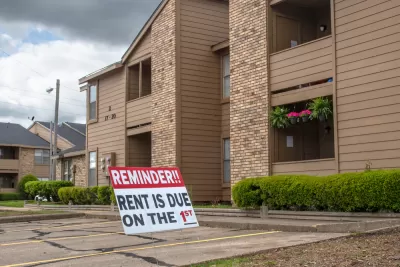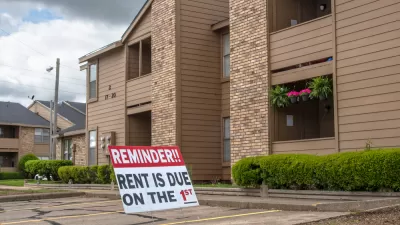Advocates have sounded alarms since the pandemic's outset about the potential for unprecedented waves of evictions as Americans deal with the economic consequences of the pandemic, but authoritative real-time data on the rental market is lacking.

Jenny Schuetz provides insight on how to scientifically and accurately predict the economic risk facing the U.S. rental market as the pandemic surpasses the seven month mark. Many households are "running on fumes," according to Schuetz, but one looming crisis, the threat of millions of evictions, has stayed in the background. Questions like "How many renters are in financial trouble?" and "How many will face eviction when current protections end?" are hard to answer, however, because there isn't a lot of real-time data for provide insight.
Policymakers and the public receive high-frequency updates on labor markets, including weekly unemployment insurance claims and monthly jobs numbers. But federal statistical agencies don’t publish real-time data on housing distress, especially for renters.
One resource of tremendous value during this time, according to Schuetz, has been the Household Pulse Survey, launched this year by the U.S. Census Bureau. New research is helping shed light on the usefulness of the data collected by the Household Pulse Survey.
"A new paper from Jeff Larrimore and Erin Troland sheds light on how responses from the Household Pulse Survey can be used to forecast how many households will miss rent payments—and a caution on how not to use the data," explains Schuetz. The key finding: comparing responses over time yields more accurate probabilities for rent payments.
Schuetz provides a lot more detail about the study's methodology, also comparing a few other studies that also attempt to wring actionable data from the survey, in an effort to gain a stronger understanding of the risk facing the U.S. rental market.
FULL STORY: How many households can’t pay next month’s rent? That’s a tricky question.

Alabama: Trump Terminates Settlements for Black Communities Harmed By Raw Sewage
Trump deemed the landmark civil rights agreement “illegal DEI and environmental justice policy.”

Study: Maui’s Plan to Convert Vacation Rentals to Long-Term Housing Could Cause Nearly $1 Billion Economic Loss
The plan would reduce visitor accommodation by 25% resulting in 1,900 jobs lost.

Planetizen Federal Action Tracker
A weekly monitor of how Trump’s orders and actions are impacting planners and planning in America.

Waymo Gets Permission to Map SF’s Market Street
If allowed to operate on the traffic-restricted street, Waymo’s autonomous taxis would have a leg up over ride-hailing competitors — and counter the city’s efforts to grow bike and pedestrian on the thoroughfare.

Parklet Symposium Highlights the Success of Shared Spaces
Parklets got a boost during the Covid-19 pandemic, when the concept was translated to outdoor dining programs that offered restaurants a lifeline during the shutdown.

Federal Homelessness Agency Places Entire Staff on Leave
The U.S. Interagency Council on Homelessness is the only federal agency dedicated to preventing and ending homelessness.
Urban Design for Planners 1: Software Tools
This six-course series explores essential urban design concepts using open source software and equips planners with the tools they need to participate fully in the urban design process.
Planning for Universal Design
Learn the tools for implementing Universal Design in planning regulations.
Caltrans
Smith Gee Studio
Institute for Housing and Urban Development Studies (IHS)
City of Grandview
Harvard GSD Executive Education
Toledo-Lucas County Plan Commissions
Salt Lake City
NYU Wagner Graduate School of Public Service




























